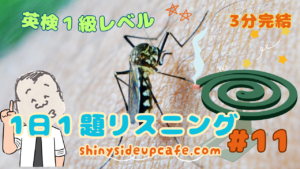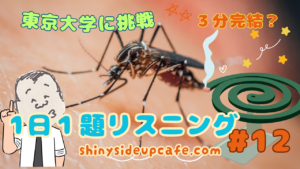Q1
1.Mosquitos often mistake it for lactic acid.
2.Its odor is used by mosquitos to find victims.
3.It can deter mosquitos when combined with ammonia.
4.Mosquitos can use it as a source of energy.
Q2
1.Exercise blocks the production of certain chemicals.
2.Body heat declines after training.
3.Athletes tend to consume less alcohol.
4.Metabolic rates increase with physical activity.
内容真偽問題として解答してみませんか?
英検1級のリスニング問題ですが、内容真偽問題として解答してみませんか?まずは、そこから…聞き取れないのではなくって、語彙が難しいのかもしれませんよ。
Mosquitos are a common annoyance and can be dangerous. Apart from bites causing skin irritation, the insects can spread disease when they insert their needlelike mouthparts into their victims. Mosquitos are adept at detecting the odor of carbon dioxide, which people release through both their breath and skin. However, as nonliving sources can also generate carbon dioxide, the insects must also rely on their ability to detect the odor of other chemicals that indicate the presence of blood. These include lactic acid, which the human body produces when it breaks down sugar for energy, and ammonia, a chemical that results from the breakdown of proteins.
But why do some people seem to be mosquito magnets, while others seem to be ignored by the bloodsuckers? Metabolic rate seems to play a significant role. This is the rate at which people’s bodies burn calories in order to perform basic life functions. Higher metabolic rates are associated with increased production of chemicals that lure mosquitos. Both physical activity and alcohol consumption temporarily increase a person’s metabolic rate. Scientists, therefore, believe that athletes working out and people who have just drunk alcoholic beverages are more likely to find themselves scratching away at mosquito bites.
Q1 What is one thing the speaker says about carbon dioxide?
1.Mosquitos often mistake it for lactic acid.
2.Its odor is used by mosquitos to find victims.
3.It can deter mosquitos when combined with ammonia.
4.Mosquitos can use it as a source of energy.
Q2 Why do scientists believe athletes are more likely to get mosquito bites?
1.Exercise blocks the production of certain chemicals.
2.Body heat declines after training.
3.Athletes tend to consume less alcohol.
4.Metabolic rates increase with physical activity.
語彙チェック
annoyance:不快さ・いらだたしさ
skin irritation:皮膚の不快感
be adept at:adept形容詞「〜に熟練している」
detect:を感知する・発見する
odor:特定の物質や物体から発せられる香りや臭い
lactic acid:乳酸
break down:を分解する
breakdown:分解:崩壊
bloodsuckers:血液を吸う生物を指す俗語
metabolic rate:代謝率
lure:を魅了する・引き寄せる・誘惑する
scratch away:かきむしる
解説:なぜ間違えたのか?
Question number 1.
What is one thing the speaker says about carbon dioxide?
本文中にMosquitos are adept at detecting the odor of carbon dioxide,とあります。なので、正解は…2.Its odor is used by mosquitos to find victims.
Question number 2.
Why do scientists believe athletes are more likely to get mosquito bites?
本文にathletes working out and people who have just drunk alcoholic beverages are more likely to find themselves scratching away at mosquito bites.とあります。その前の部分に理由として、Both physical activity and alcohol consumption temporarily increase a person’s metabolic rate.とありますから、正解は…4.Metabolic rates increase with physical activity.
※解答の根拠を聞き取れるか?ということなのですが、英検1級は、metabolic rate:代謝率、lactic acid:乳酸など、語彙のレベルが難しいので、試験のための英語の勉強というより、常日頃出てくる話題を英語で表現できるか考えていきましょう。
解答
Q1…2 Q2…4













コメント